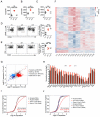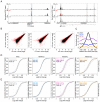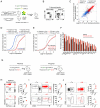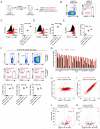Memory of Inflammation in Regulatory T Cells
- PMID: 27499023
- PMCID: PMC4996371
- DOI: 10.1016/j.cell.2016.07.006
Memory of Inflammation in Regulatory T Cells
Abstract
Eukaryotic cells can "remember" transient encounters with a wide range of stimuli, inducing lasting states of altered responsiveness. Regulatory T (Treg) cells are a specialized lineage of suppressive CD4 T cells that act as critical negative regulators of inflammation in various biological contexts. Treg cells exposed to inflammatory conditions acquire strongly enhanced suppressive function. Using inducible genetic tracing, we analyzed the long-term stability of activation-induced transcriptional, epigenomic, and functional changes in Treg cells. We found that the inflammation-experienced Treg cell population reversed many activation-induced changes and lost its enhanced suppressive function over time. The "memory-less" potentiation of Treg suppressor function may help avoid a state of generalized immunosuppression that could otherwise result from repeated activation.
Copyright © 2016 Elsevier Inc. All rights reserved.
Figures







References
-
- Belkaid Y, Tarbell K. Regulatory T cells in the control of host-microorganism interactions (*) Annual review of immunology. 2009;27:551–589. - PubMed
Publication types
MeSH terms
Substances
Grants and funding
LinkOut - more resources
Full Text Sources
Other Literature Sources
Molecular Biology Databases
Research Materials

